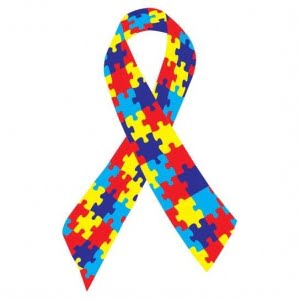 Autism Awareness Day is April 2nd. It’s a time when people wear blue and rock their multi-colored puzzle pieces in order to bring attention to those with Autism Spectrum Disorder, what it means and the many shapes it can take. The goal of the day is to help improve the quality of life for people with ASD by educating others and come together to shape a way that they can create meaningful lives and participate in the world.
Autism Awareness Day is April 2nd. It’s a time when people wear blue and rock their multi-colored puzzle pieces in order to bring attention to those with Autism Spectrum Disorder, what it means and the many shapes it can take. The goal of the day is to help improve the quality of life for people with ASD by educating others and come together to shape a way that they can create meaningful lives and participate in the world.
But what about the strong mothers, fathers, brothers, sisters, aunts, uncles, grandparents, behavior support specialists, and all the people that come together to take care of an individual with autism? Heck, they are probably the ones that created Autism Awareness Day. Their quality of life and the meaning of their lives take a dramatic shift when autism comes into their immediate existence. Autism Awareness is crucial! But so is stopping to take notice of the heroes who have shifted their life and lens on the world for the greater wellbeing of another.
First: if you are one of these heroes, thank you. If you are not one of these people but maybe know a dedicated someone who is, take the time today to tell them you appreciate them or that they are simply doing a great job. This recognition is huge for the emotional and mental wellbeing of people caretaking for those with autism.
Supporting the Caregiver: This can take many forms!
- Words of Affirmation- those with autism are not always able to say thank you, so be sure to let their caregiver know you appreciate them, that you like their new chart, encourage them when a new schedule is difficult because adjusting takes time, anything to show that you see all that they are doing. Help teach whomever they are taking care of the words or sign for thank you.
- Draw a Bath- This can be taken literally or figuratively. The point is, make sure that the caregiver has time to relax and unwind. Encourage them to have one activity that is relaxing and quiet. Often times, caregivers are on sensory and emotion overload because they are operating in the autistic world. It is ok to step out of it and enjoy some alone time.
- Get by With a Little Help from my Friends- Caregivers not only need alone time, they need to be able to step out and be able to spend time with friends, be social, and have a support group. The energy of other people is refreshing and renews patience. It helps caregivers feel less consumed by autism so they are able to give it their all when they are helping their loved one. Encourage to go out.
Caregiver Self-care: If there is someone encouraging you or trying to give you any of the above, take a breath and accept it. It is perfectly healthy to take time or need a break. If you do not have this support system, reach out, ask for help and identify the ways in which you can take care of yourself. Everyone’s situation looks different, so self-care will be different for each of you. You are doing a great job; autism is like learning a new language, which is never easy.
- Wake up early: Get up an hour or two before your loved one to grant yourself some time to yourself and to center before the day begins.
- Pick one thing! Whether it is going out with friends, seeing a movie on your own, reading a book, going on a hike, taking a class, whatever it is, pick one thing for you and dedicate yourself to it at least ONCE a week. Make it a part of the schedule and routine.
- Find an activity you both enjoy- taking care of someone with autism can be stressful. It can have you in Go-Mode all the time. Find an activity you both really enjoy that lets you both bond and connect and make sure to implement that once a week as well. It can be simple, like watching a movie or coloring.
Quick Tip: Autism often is not only autism; there are often other diagnoses that pair with it. This makes each person even more unique, just as the saying suggests, “If you have met a person with autism, then you have met one person with autism.” If you are a caregiver, or even a behavioral interventionist with multiple autistic clients, make sure you have mental health care as well and seek the support of a counselor. Autism can be overwhelming and as predictable as it can be, it can be just as wild and unpredictable. Sometimes other diagnoses make it more difficult to manage and/or there are aggressive behaviors. Having a counselor to support you is key to properly coping and moving through life with autism.
Again: Thank you for all you do!
Helpful Resources:
The sign for thank you.

A source for newly diagnosed families:
https://www.autismspeaks.org/tool-kit-excerpt/caring-caregiver
Quick links! Autism Speaks is a great resource for all!
https://www.autismspeaks.org/support-family-members
A place full of resources and help:
https://thecaregiverspace.org/resources-autism-spectrum/
By: Adalyn Wilson, MHC Intern
